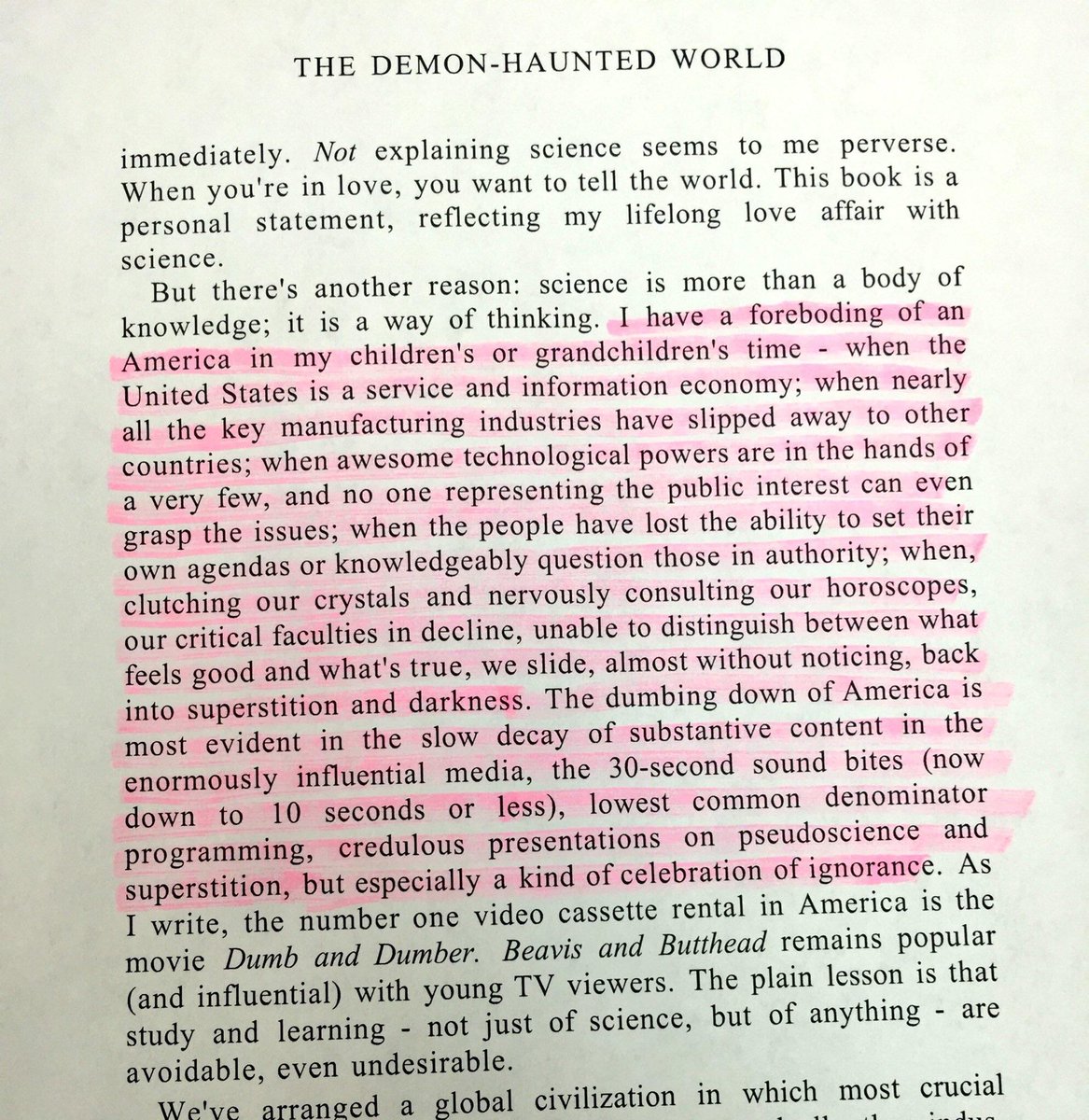
I was just sent this bit of boilerplate* by someone who is either upset with my recent dissing of his Saganhead or believes that their man-god invented the ideas contained in it in 1995. You can find the same things said decades, centuries before Sagan said it. You might try Newt Minnow's famous "Vast Wasteland speech of 1961 and similar things going back to Plato and his hatred of what he considered the low minds of anyone but aristocratic citizens of Athens.
I will point out that since lying has become the huge moral issue which has gotten us things like Donald Trump, climate change denial, the promotion of fascism and neo-Nazism in all their malignant forms, that there is nothing at all in atheism that can tell you what moral absolute even the worst lies are a violation of. Materialism, such as was Sagan's stated credo in his beginning to Cosmos, can't tell you why you shouldn't tell a lie if it gets you what you want. Sagan's own faith tradition has played a huge role in bringing us to the discrediting of the moral absolute that a truth is better than a lie, that a lie is always a moral wrong unless there is a supreme higher moral value that requires one be told, the lying to the Nazis about where the Jewish children are hidden, exception.
Atheist-scientistic-materialism, the faith tradition of the so-called "Enlightenment", even as its classical phase decayed into the 19th-20th century romantic phase of it and on to its total decay into mass media induced pop culture (I'd love to ask the shade of Sagan what he thinks of his heir apparent, Neil Degrasse Tyson's remake of Cosmos), inevitably led us where we are, it is what disempowered the left, first through a loss of self-confidence in the absolute character of the morality that is the foundation of American liberalism, then in the assertion that, as Steve Weinberg says, you can't prove that not being a selfish bastard is wrong. The vulgar materialist right was aided by that self-defeating effort of the hoity-toity materialists. That loss of confidence is the key to understanding the disaster we are living in, the thing that made all of the difference in the sporadic progress made in the past. Freeing the press to lie, one of the great goals and achievements of the "secular" athiest, pseudo-left, was the key mistake that was made.
*
Definition of boilerplate
- 1: syndicated material supplied especially to weekly newspapers in matrix or plate form
- 2a : standardized textb : formulaic or hackneyed language
I found a post at Slate (my own post on it to publish soon) critiquing science for being taken as "truth" when it is no such thing. Pretty good argument, but the comments were even more interesting. The "top comment" dismissed the argument out of hand, without even trying to engage it. Because, you know, science is beyond repute, and can only be praised and never be critiques.
ReplyDeleteSagan's observation is so hackneyed it was beyond cliche when he wrote it. Not to mention the elitist stance that "what is popular is beneath my consideration, therefore people who make it popular are stupid." And I'm trying to figure out what manufacturing has to do with setting one's own agenda and not clutching crystals, etc. Honestly, that's as clueless and historically ignorant an argument as I've ever encountered. Somehow I don't remember, back when America literally built it's way into victory over Germany, that factory workers were all scholars in their spare time, reading Greek literature in the original language and parsing the insights of Cicero in learned discussions conducted in Latin.
I do recall, from history not personal experience, a boom in mail-order koine Greek lessons in America in the early 20th century, one prompted by scriptural studies and a desire to read the Christian scriptures in their original tongue. But that's a boomlet in education prompted by religion, so that can't count, right?
As I mentioned yesterday, a lot of people motivated by religion seem to understand that in order to know what something says you have to read it, something which is news to many of the devout in the Church of Scientism. I will say that late in my life, as I started to take Marilynne Robinson's example and read things that I'd always assumed I'd known through second-hand and worse characterizations of them and found how many of those didn't say what they were purported to, it made a huge difference in how I understood things. You would assume someone who'd been to college and grad school would realize that about something outside of their own field but even many public alleged intellectuals don't seem to get that. And their fan boys are even worse. The comment that came with the image link was repulsively hagiographic of St. Carl, emetically so. I'm sure if he hadn't been a TV celebrity he wouldn't be considered that way. And people wonder how Trump suckered millions in by just having his fat, ugly face and putrid personality on TV.
DeleteSatan and Dyson were both"made" on TeeVee. And yeah, I learned philosophy by reading directly. Some commentary at first was helpful, but if you don't go to the source, you get misdirected. It's harder, but you get it right. Or closer than "everybody knows."
ReplyDeleteStupid auto-correct.
ReplyDeleteIt's tripped me up more than once.
Delete